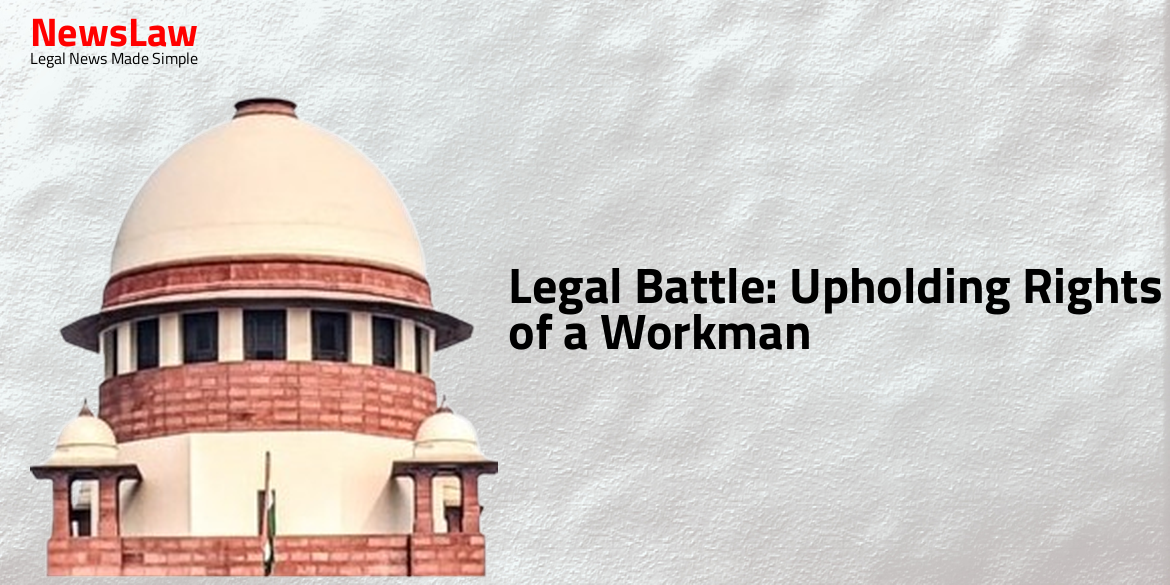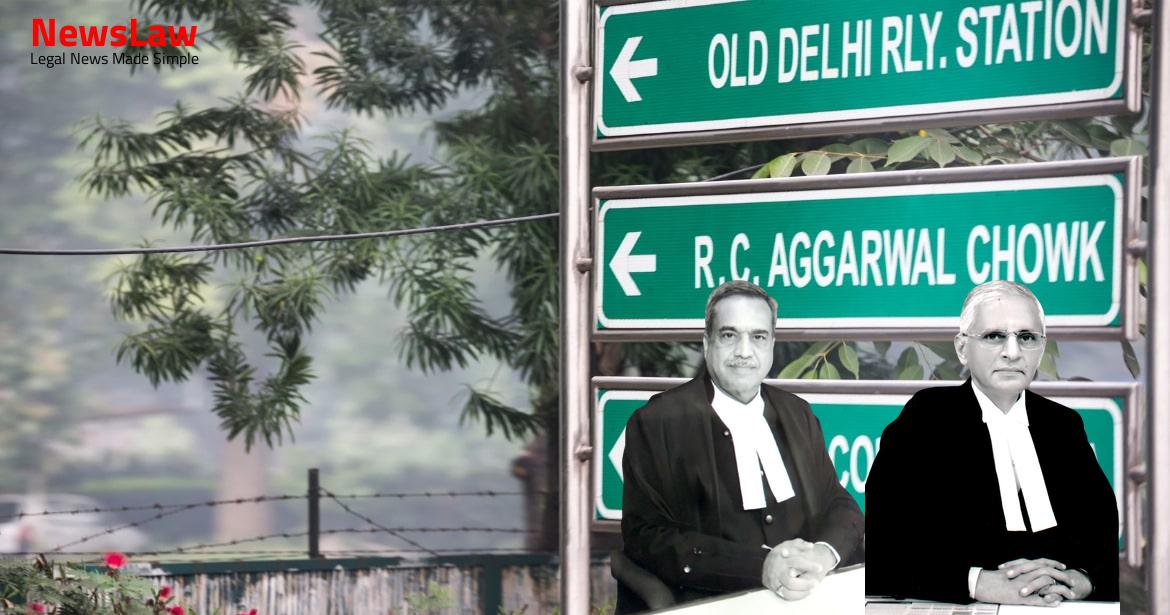In a recent judgment by the Delhi High Court, the rights of a workman have been upheld, marking a significant victory for justice in industrial disputes. The case involves a dispute between the workman and the company over alleged misconduct and termination. The court’s decision sheds light on the importance of adhering to principles of natural justice and statutory provisions in such cases.
Facts
- The respondent, Sh. Dilip Kumar Thakur, was working as a Senior Operations Executive with the petitioner company on probation basis from 1 July 2015.
- The company alleged that the respondent displayed acts of indiscipline, negligence towards duty, and indecent behavior towards colleagues and seniors.
- In 2016, during organizational restructuring, the company decided to retrench the respondent due to misconduct and callous attitude.
- The respondent filed a statement of claim under the Industrial Disputes Act, 1947 seeking compensation and reinstatement.
- An execution petition was filed before the District Court, Tis Hazari, resulting in a warrant of attachment against the company’s bank account.
- Cost of litigation is allowed to the respondent as the claim has been pending since 2017.
- The due amount, including interest at 9% per annum, is to be paid within one month of the Award publication.
- A retrenchment notice was issued to the respondent on 22 March 2016, terminating his services from 31 March 2016.
- A copy of the Award will be sent to the Deputy Labour Commissioner for publication and enforcement.
- The management’s statement indicated the closure of the ME on 18.01.2020.
- The learned Labour Court held the retrenchment of the workman as illegal for not complying with principles of natural justice.
- The Labour Court passed an award for reinstatement of the workman with backwages and consequential benefits.
- The workman is entitled to reinstatement within 15 days from the date of the award.
- The petitioner claimed to have paid Rs.53,918/- as retrenchment compensation but failed to provide bank statement as evidence.
- The onus shifted to the petitioner to prove payment of salary and not retrenchment compensation.
- The evidence showed the workman worked more than 240 days a year with the management, meeting legal requirements.
- The employer failed to maintain the muster roll of the workman as required by law.
- The findings from previous issues were applicable to the current ones, leading to the workman’s entitlement to full wages, reinstatement, and consequential benefits.
- Retrenchment was deemed illegal and the workman entitled to full back wages and reinstatement.
- Cost of litigation allowed to the workman due to the case pending since 2017.
- The Tribunal found the petitioner’s contention of full and final settlement with the workman not acceptable and frivolous.
Issue
- The issue before the learned Court was whether the workman voluntarily abandoned his job after receiving all dues from the management.
- The learned Tribunal framed specific issues to address the matter at hand.
- This included determining if the workman abandoned his job voluntarily and if his services were terminated illegally or unjustifiably by the management.
- If the workman is found to have voluntarily abandoned his job, the consequential remedies he is entitled to must be established.
Arguments
- The petitioner company contends that the respondent’s termination was in accordance with the terms of the offer of appointment.
- The company disbursed retrenchment compensation to the respondent’s associate as authorized by the respondent.
- Evidence shows that the respondent received retrenchment compensation and other payments from the company.
- The termination was due to economic restructuring and disciplinary issues aimed at streamlined human resource allocation.
- The Labour Court failed to consider evidence of disturbances created by the respondent within the company.
- The claim that the company owed the respondent Rs.70,000 lacks supporting documentation.
- The company’s witness confirmed instructions from the respondent for full and final settlement.
- The company paid the respondent his bonus and Leave Travel Allowances as confirmed by evidence and statements.
- The Labour Court’s conclusion on the validity of the settlement lacks proper consideration of all facts.
- The absence of a resignation letter weakens the company’s contention of a settlement with the respondent.
- The respondent workman was terminated verbally without citing any reasons.
- The petitioner company served a retrenchment notice citing grave misconduct, acts of indiscipline, negligence towards colleagues and seniors.
- The respondent denies receiving proper notice in accordance with the terms of appointment.
- The respondent workman did not authorize anyone to receive the final settlement amount on his behalf.
- The termination is considered illegal and unjustified as per Section 25(F) of the Act.
- The respondent was deprived of the opportunity to be heard, violating principles of natural justice.
- The petitioner company failed to provide evidence that the amount disbursed was compensation and not salary.
- The respondent contends that he is entitled to statutory benefits as per Section 25-B of the Industrial Dispute Act.
- No inquiry was conducted by the petitioner company for the alleged misconduct of the respondent.
- The onus of proof lies with the petitioner to establish that the amount paid was as retrenchment compensation.
Analysis
- The burden of proof is on the employer to prove abandonment before a case of abandonment of job can be established.
- In cases of illegal retrenchment, the employer must provide evidence of compliance with statutory provisions and principles of natural justice.
- The management failed to prove abandonment or termination of services with proper notice or inquiry.
- Settlement document lacked essential details like date of resignation, raising doubts about its authenticity.
- Employee worked for more than 240 days in a year, entitling protection under labor laws.
- The burden of proof is on the management to show that the workman was gainfully employed post-termination to avoid paying full back wages.
- Management’s reliance on a settlement document was found to be unsubstantiated, leading to dismissal of their claim.
- The court emphasized the necessity of proving compliance with labor laws and maintaining proper records of payment and deductions.
- The onus was on the petitioner to provide concrete evidence supporting their claims regarding the termination and settlement.
- The witness testimonies and lack of documentation weakened the management’s position in the case.
- The Labour Court held that termination without proper inquiry or charge is considered illegal retrenchment.
- The workman is entitled to reinstatement with full back wages in case of illegal termination.
- The employer must provide evidence of abandonment before claiming abandonment of job.
- The burden of proof lies on the employer to prove abandonment.
- In cases of wrongful termination, reinstatement with continuity of service and back wages is the norm.
- Factors like length of service, nature of misconduct, and financial condition of the employer are considered while awarding back wages.
- The employee must declare lack of gainful employment or reduced wages to claim back wages.
- The adjudicating authority may award full back wages if the employer falsely charges the employee.
- The judgment cited the case of Eagle Hunter Solutions Limited regarding the onus of proving abandonment.
- Labour Court/Industrial Tribunal can exercise power under Section 11-A of the Industrial Disputes Act, 1947.
- Punishment may be considered disproportionate even if the enquiry was fair.
- Discretion can be used to not award full back wages in such cases.
- Full back wages may be awarded if employee is found not guilty or false charges were alleged.
- Employer’s gross violation of statutory provisions or principles of natural justice may lead to full back wages directive.
- The respondent is entitled to reinstatement.
- The respondent is entitled to all consequential benefits.
- The respondent shall be reimbursed the cost of litigation since the matter has been pending since 2017.
Decision
- The impugned award passed by the Labour Court is upheld.
- The petition is dismissed.
- The decision was made by the Presiding Officer, Labour Court, Rouse Avenue, New Delhi.
- The award was dated 24 March, 2021.
Case Title: ATLAS LOGISTIC PVT LTD Vs. MR JITENDRA KUMAR (2024:DHC:4628)
Case Number: W.P.(C)-10371/2022



